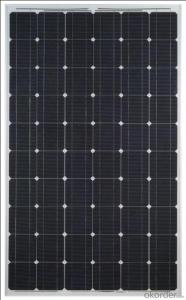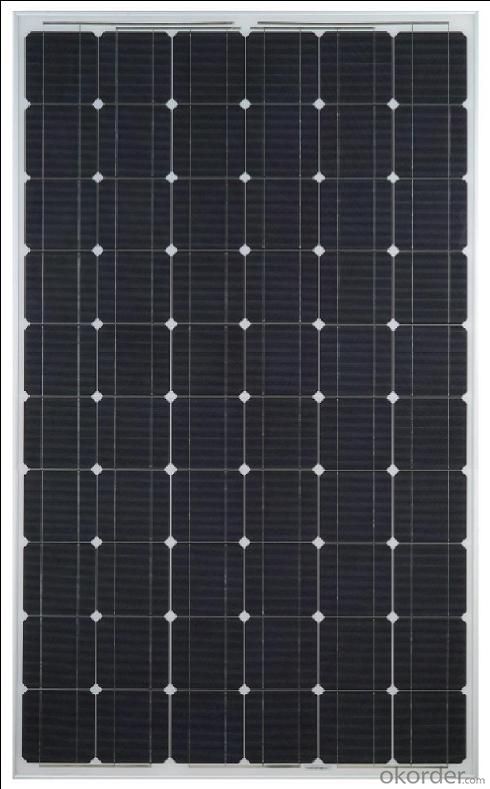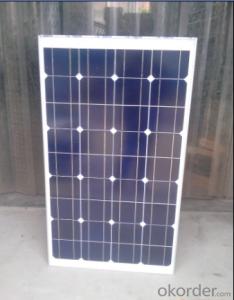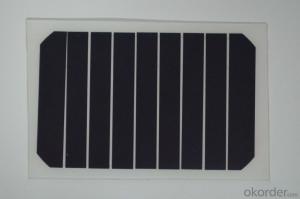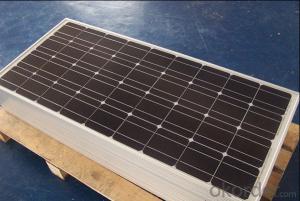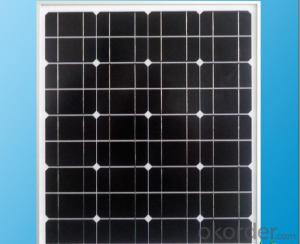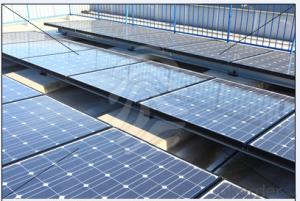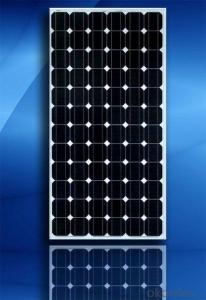300 Watts Monocrystalline Solar Panel with 25 Year Warranty CNBM
- Loading Port:
- Qingdao
- Payment Terms:
- TT OR LC
- Min Order Qty:
- 10 set
- Supply Capability:
- 300000 set/month
OKorder Service Pledge
OKorder Financial Service
You Might Also Like
Monocrystalline Solar Modules
We offers a range of small, medium and large monocrystalline solar modules, designed for a range of requirements.
Specifications:
Tolerance | +/- 3% |
Cell | Monocrystalline silicon solar cells |
N0. of Cells | 72 (12 x 6) |
Dimension of Modules (mm) | 1581 x 809 x 40 |
Weight (kg) | 15.5 |
Limits:
Operating Temperature | -40~+85? |
Storage Temperature | -40~+85? |
Maximum System Voltage | 1000 VDC max. |
Hail Impact | Diameter of 28mm with impact speed of 86km/h |
Temperature and Coefficients:
NOCT | 48C+/-2? |
Voltage temperature coefficient (%/K) | -0.34 |
Current temperature coefficient (%/K) | 0.09 |
Power temperature coefficient (%/K) | -0.37 |
Characteristics:
Model: | SGM-160D | SGM-165D | SGM-170D |
Max-power voltage Vmp (V) | 34.5 | 35.4 | 35.8 |
Max-power current Imp (A) | 4.64 | 4.66 | 4.75 |
Open-circuit voltage Voc (V) | 41.75 | 43.6 | 43.32 |
Short-Circuit Current Isc (A) | 5.32 | 5.08 | 5.38 |
Max-power Pm(W) | 160 | 165 | 170 |
Model: | SGM-175D | SGM-180D | SGM-185D |
Max-power voltage Vmp (V) | 36.1 | 36.2 | 36.2 |
Max-power current Imp (A) | 4.85 | 4.97 | 5.11 |
Open-circuit voltage Voc (V) | 43.68 | 43.8 | 44.8 |
Short-Circuit Current Isc (A) | 5.49 | 5.48 | 5.51 |
Max-power Pm(W) | 175 | 180 | 185 |
STC: Irradiance 1000W/m2, Module temperature 25?, AM=1.5
Monocrystalline Solar Panels Specifications Range
Maximum Power (Pm) | Dimension | Weight | Operating Voltage (Vmp) | Operating Current (Imp) | Open Circuit Voltage (Voc) | Short Circuit Current (Isc) |
3W | 158x241x25mm | 0.5kg | 8.5V | 0.36A | 10.5V | 0.4A |
4W | 308x166x25mm | 0.77kg | 8.5V | 0.47A | 10.5V | 0.54A |
4W | 308.x166x25mm | 0.77kg | 16.8V | 0.24A | 21V | 0.27A |
5W | 296x215x25mm | 0.3kg | 16.8V | 0.48a | 21V | 0.54A |
10W | 286x406x25mm | 1.5kg | 16.8V | 0.59A | 21V | 0.66A |
12W | 286x406x25mm | 1.5kg | 16.8V | 0.71A | 21V | 0.8A |
14W | 286x541x25mm | 2kg | 16.8V | 0.83A | 21V | 0.96A |
16W | 286x541x25mm | 2kg | 17.2V | 0.93A | 21.5V | 0.99A |
18W | 296x541x25mm | 2.4kg | 18.8V | 1.07A | 21V | 1.2A |
20W | 296x641x25mm | 2.4kg | 17.2V | 1.15A | 21.5V | 1.24A |
24W | 541x451x25mm | 3.15kg | 16.8V | 1.14A | 21V | 1.56A |
26W | 541x451x25mm | 3.15kg | 17.2V | 1.51A | 21.5V | 1.63A |
30W | 296x966x25mm | 3.85kg | 16.8V | 1.78A | 21V | 2.03A |
36W | 541x641x35mm | 4.7kg | 16.8V | 2.14a | 21V | 2.4A |
40W | 541x641x35mm | 4.7kg | 17.2V | 2.33A | 21.5V | 2.5A |
55W | 1057x457x35mm | 6.6kg | 17.6V | 3.12A | 21.6V | 3.3A |
70W | 546x1196x35mm | 8.5kg | 16.8V | 4.15A | 21V | 4.7A |
75W | 546x1196x35mm | 8.5kg | 17.2V | 4.36A | 21.5V | 4.8A |
80W | 546x1196x35mm | 8.5kg | 17.6V | 4.55A | 21.6V | 4.9A |
110W | 1066x811x40mm | 11.8kg | 17.6V | 6.25A | 21.6V | 6.6A |
150W | 1066x811x40mm | 14kg | 34.4V | 4.36A | 43.2V | 4.7A |
- Q: How do solar panel power systems work?
- The panels soak up the energy from the sun and then convert the energy into power, electricity, etc. They can also store a lot of energy so that we still have power on cloudy days. Does that help? Without more info, its hard to get more specific.
- Q: Hi. I have been looking into getting solar panals but I only want them for one room. See, we're expanding the house by adding a basement, the basement isn't going to be that big but we wanted to have solar energy for the basement only. Could anyone give me a rough estimate on the cost of solar panals for my basement?
- If you know where to look you get get solar panels for zero costs. For example, a lot of sign companies use solar panels. Contact your local sign company and tell them you will haul off all their broken solar panel for free. They are generally more than willing to let you do this.
- Q: Lower solar panel/wind turbine prices allow wider applications, hence a great help to a greener mother earth!
- go okorder / they sell books on how to build solar panels and wind turbines, along with a lot of other things that could help you live off grid. And a lot of the books were things that could be made with turn of the century (900 not 2000) technology
- Q: What i would like to know is if you were using commercially available solar panels, clustered as close together as possible and spread out on one acre, how much electrical energy is produced? if u can 'translate' this into terms of ( hour of average daylight = powering a ____ for X units of time)
- In okorder /
- Q: About how much would it cost to purchase and install solar panels for the average American house so that the house can be off the power grid and use the same amount of electricity as it normally does?
- My friend has a system with 6 Panels, I think about 6 large batteries (Like Golf Cart Battery), a 5 KW Generator. It also has all the electronic controllers and monitors. He has about $30,000-$35,000 in his system. It does pretty good except it will not support air conditioning or heat without running the generator which is expensive. He has some niehbors that have air conditiong, but they use a gas / ammonia cycle for that. Caution, even with these systems they must be very careful with power usage, or they must run generators. They are located in the Sonoran desert where the sun shines just about every day so it is the very best of conditions. Based on this, I would say a system that would match the average household usage would cost around $80,000 or more, and would need a huge roof or large open area facing south. Probably not practicle, but possible.
- Q: are solar panels just a photodiode?A Photodiode converts light into either current or voltage? Right?
- Yes, so are camera sensors. Except in cameras they're specially desgined to reduce noise.
- Q: I have created a solar setup in my shed i have 2x.5w solar panels i am hoping to charge my 55ah car battery how long would it take to charge the battery and how many watts could i used a day
- I don't think so, but if it did, it would take a very long time. You need enough wattage or amps to push the power in the battery and 3w may not be enough. You would be better off with a small 2v battery, maybe the type they use for emergency lights. I would use a sealed battery for this type of setup because car batteries are designed for heavy charging with alternators from 60 amps and up.
- Q: could any tell me what type off panel is the best tube or flat and how much it should be. I live in N Ireland
- The type solar system to be installed your new house depends the shape and dimensions of house.Himin newly launched solar house.
- Q: How do solar panels impact the local job market?
- Solar panels have a positive impact on the local job market by creating new employment opportunities. The installation, maintenance, and manufacturing of solar panels require a skilled workforce, leading to job growth in these sectors. Additionally, the renewable energy industry stimulates economic development and attracts investments, resulting in job creation across various industries.
- Q: i really need to know howbecause im building a solar powered car for science fair :]thank you!
- You might need some help from the sun.
Send your message to us
300 Watts Monocrystalline Solar Panel with 25 Year Warranty CNBM
- Loading Port:
- Qingdao
- Payment Terms:
- TT OR LC
- Min Order Qty:
- 10 set
- Supply Capability:
- 300000 set/month
OKorder Service Pledge
OKorder Financial Service
Similar products
Hot products
Hot Searches
Related keywords
